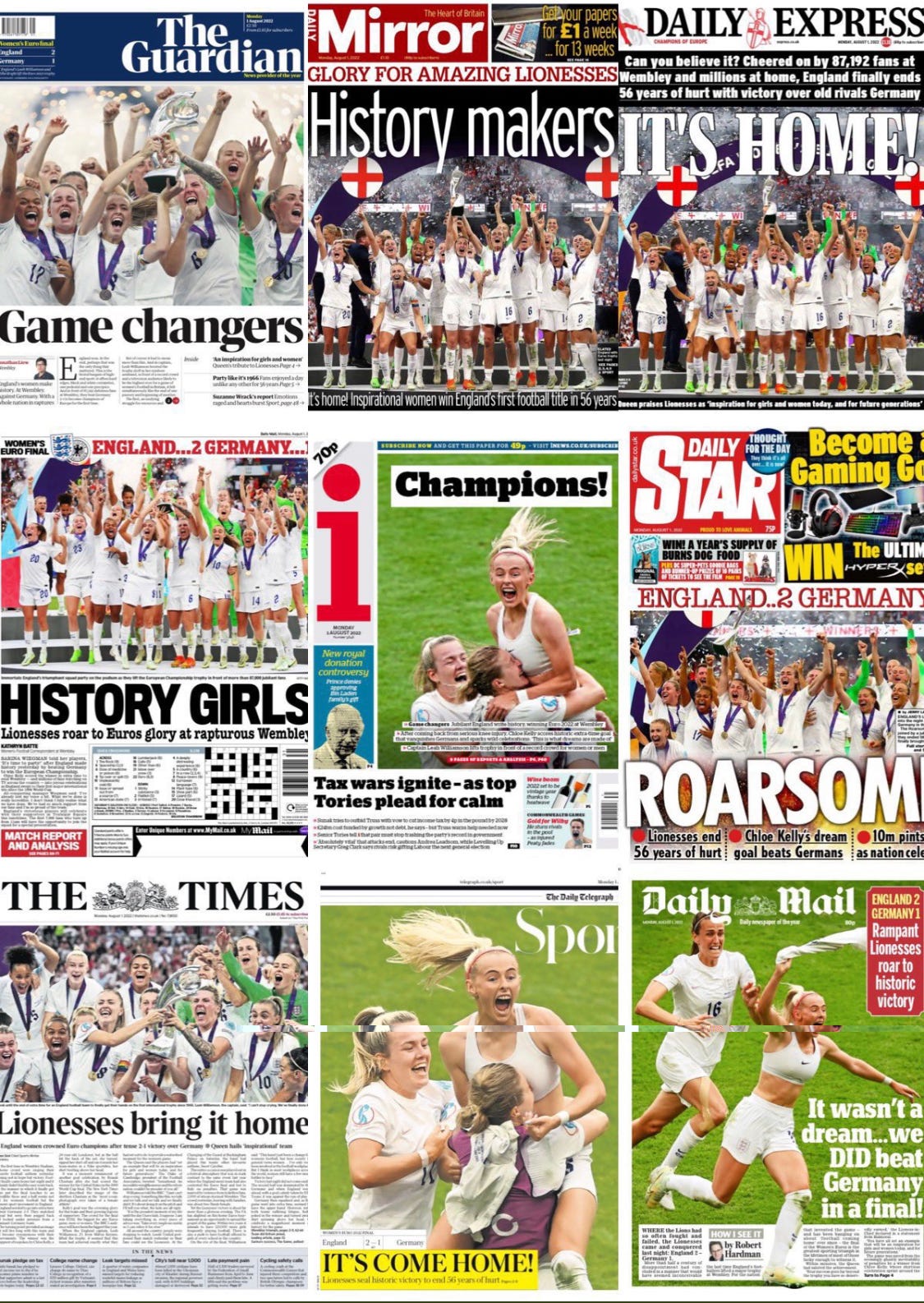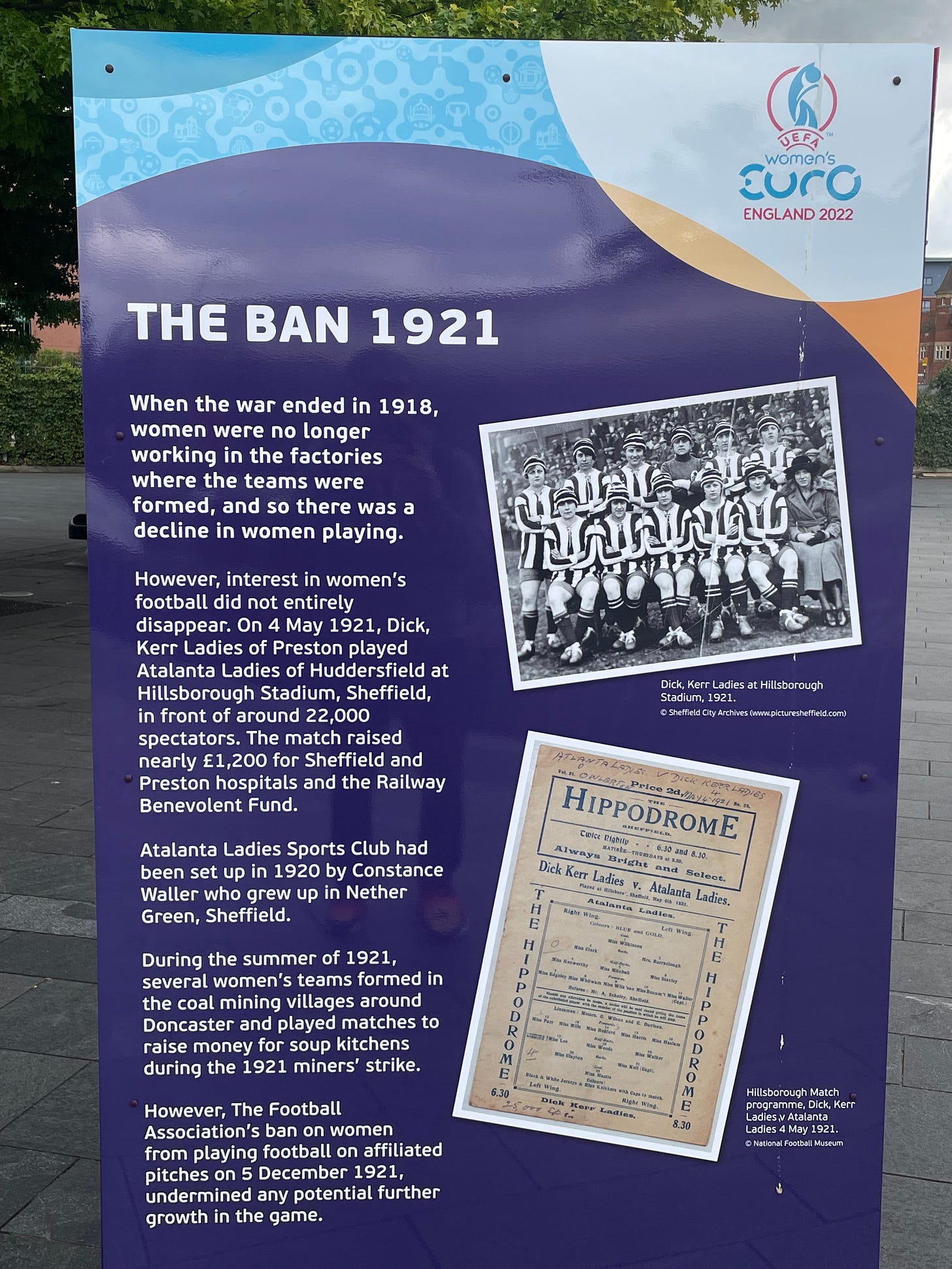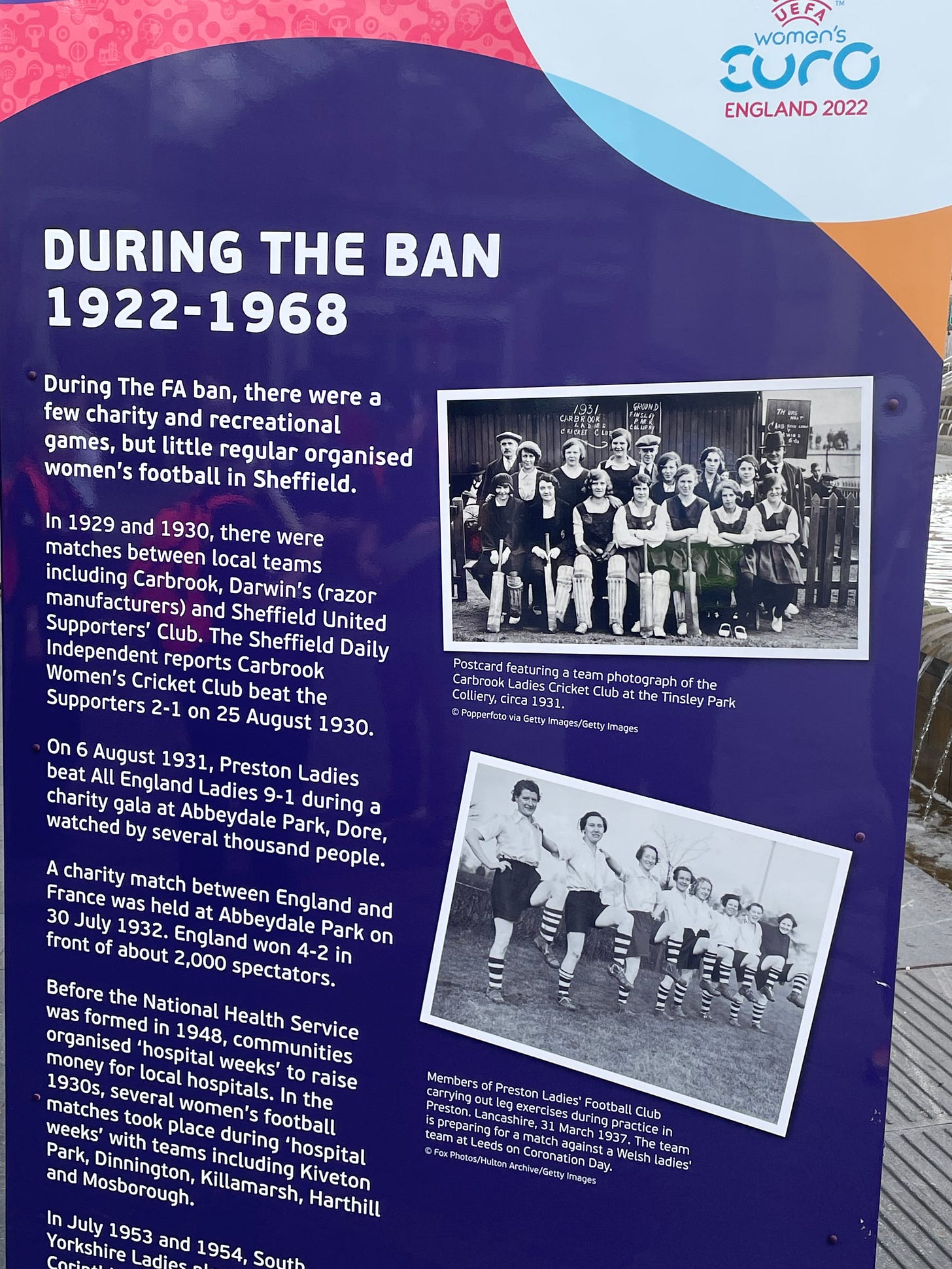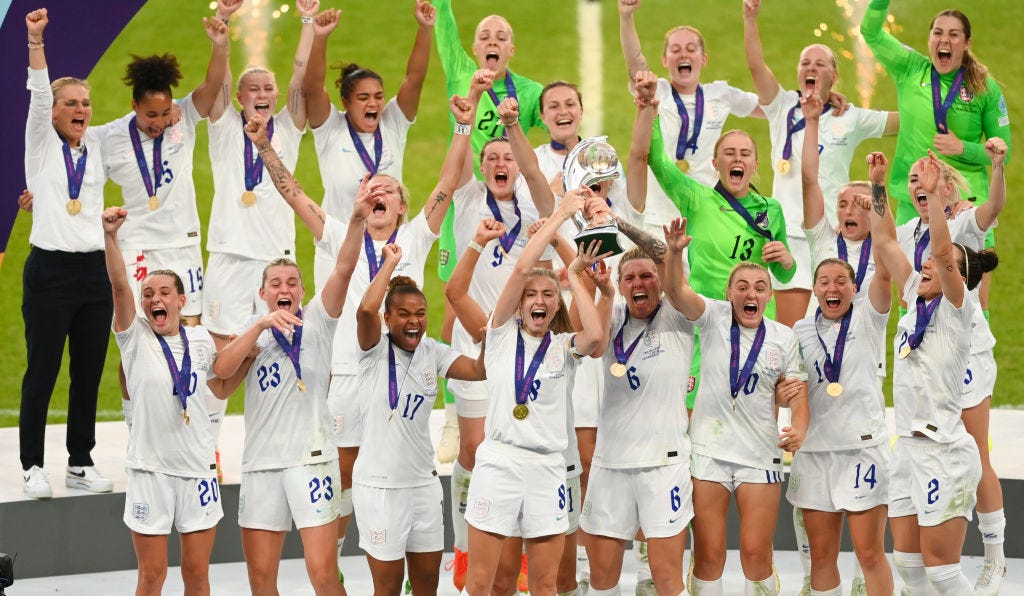Premium: England Has Its Own 1999
Women's soccer takes over England as the Lionesses win Euro 2022 on home soil

LONDON — The comparison first hit me on Tuesday night, not long before England’s semifinal with Sweden, when I was outside Bramall Lane in Sheffield, and the bus carrying the England women’s national team happened to arrive near where I was standing.
As I observed the scene of the home fans surrounding and serenading the bus with cheers, one thing in particular stood out: The players inside the bus were shooting cellphone videos of the spectacle just as much as the supporters were turning their cameras on the team.
All-encompassing national fervor is new to the Lionesses, who have long toiled in obscurity compared to their men’s counterparts. And it made me think back to the same thing happening with the U.S. women’s national team players before the first game of the 1999 World Cup. As their bus made its way up the New Jersey Turnpike to what would be a sold-out Giants Stadium, it slowly dawned on the USWNT that the overwhelming traffic was there for them.
It’s not that women’s soccer was totally absent from English culture. After all, the surprise hit film Bend It Like Beckham (2002) was literally about a women’s soccer team in London. But if you recall, 1) a major plot line was about Jess (Parminder Nagra), whose family didn’t want her to be playing the sport, and 2) “Success” for young women’s players meant earning a scholarship to play college soccer in the U.S. (since England didn’t have anything remotely like it).
GrantWahl.com is a reader-supported soccer newsletter. Quality journalism requires resources. The best way to support me and my work is by taking out a paid subscription now. Free 7-day trials are available.
A transcendent cultural moment was happening, and so the stunned U.S. players shot video of something they had never seen before (albeit with old-school camcorders instead of cellphones). We all know where that monthlong American celebration ended: with a World Cup title before a crowd of 90,185 at the Rose Bowl.
England’s version of 1999 took place in 2022, and it culminated on Sunday with the Lionesses beating Germany 2-1 in extra time at Wembley Stadium. And in a perfect piece of symmetry, England forward Chloe Kelly celebrated her game-winning goal in the 111th minute by repeating what the U.S.’s Brandi Chastain did after her World Cup-clinching penalty kick in 1999: ripping off her jersey, twirling it over her head and celebrating in her sports bra with her teammates. (The automatic yellow card was, obviously, worth it.)
Over the last month, England fell irretrievably in love with its women’s soccer team. There’s nothing like being in a host country when it performs well in a major international soccer tournament. The national pride, the living and dying with every game, the spontaneous celebrations in bars and public squares—they take over a country’s daily culture. USA 1994, France 1998, USA 1999, South Korea 2002, Portugal 2004, Germany 2006, Brazil 2014, Russia 2018: All you have to do is say the country and the year, and it conjures some of the best memories I have of covering this sport. (I also remember the epic cultural sadness when those host countries went out of those tournaments; see: Brazil 2014.)
Now you can add England 2022. The images of the Lionesses’ six Euro games, all of them victories, will be imprinted on their supporters forever: The 68,871 fans who packed Man United’s Old Trafford for their opening 1-0 win over Austria; the stunning force of thrashing former World Cup champion Norway 8-0 (in a game that was 6-0 at halftime); the soul-stirring comeback against Spain in the quarterfinals to win 2-1 on Georgia Stanway’s thumping extra-time wonder strike; Alessia Russo’s outrageous backheel goal in a 4-0 semifinal win over Sweden; and the wild celebrations after Kelly’s winner against the Germans.
You can measure the country’s newfound passion in any number of ways. If you’re into data, the national TV audience in the U.K. peaked at a giant 17.4 million during Sunday’s final (with another audience almost the exact same size in Germany), and 87,192 fans filled Wembley—a record attendance for any game ever at a European Championship, men’s or women’s.
But there are other examples of how besotted Blighty became over the Lionesses. Like the way everyone stayed in the stadium for nearly an hour after the final whistle and sang “Sweet Caroline” with the England players, who performed running slip-and-slides on the massive piles of silver confetti on the field. It was as if nobody wanted to leave, and so they didn’t.
Or take the conversation I had before the game in the press section with a friend of mine, an English woman who has covered women’s soccer here for years. Knowing how hard she has been working, I asked her if she had taken the time to step back on Sunday and reflect on what we were seeing in front of us for an England women’s soccer game.
“Oh, don’t worry,” she said. “I’ve cried three times today already.”
As the fútbol-loving University of Michigan professor Andy Markovits has noted, women’s soccer has had a harder time breaking through in many of the biggest men’s soccer countries than it has had in nations like the United States or Scandinavian countries.
England, in particular, has been notorious when it comes to the massive culture around men’s soccer denigrating the women’s game. (You still see and hear plenty of it, especially on social media.) As was the case in several other nations, England’s soccer federation, the FA, banned women from playing the sport for decades (from 1921 to 1968).
I thought it was a good thing that the historical context was being publicized during this tournament; when you arrived at the train station in Sheffield, you were greeted by large signs with all the details of England’s women’s soccer ban and the way women defied that ban and attempted to build a soccer culture anyway.
But the official neglect of the women’s game in England made its mark. When I started covering soccer in 1996, I couldn’t believe that England’s team wasn’t any better than it was. The Lionesses didn’t even qualify for the World Cups in 1991, ’99 and 2003, and they didn’t advance past the final eight in ’95, ’07 or ’11.
English talent did exist in those days. Kelly Smith was an attacking phenomenon who wasn’t appreciated nearly enough in her own country during her playing days. When Smith was at her best and not dealing with severe injuries during her NWSL and Arsenal days, she could be unstoppable.
(A quick Kelly Smith story: When she was drafted No. 2 overall out of Seton Hall by the NWSL’s Philadelphia Charge in 2001, I idiotically criticized the Charge for picking her that high. Not only did she prove me completely wrong, but she also later wrote in her memoir that my dumb comments had motivated her to succeed. When I finally met up with Kelly in person at the 2015 World Cup—we were working together for Fox Sports TV—I profusely apologized, and now I’m lucky to say we’re friends.)
It’s not that women’s soccer was totally absent from English culture. After all, the surprise hit film Bend It Like Beckham (2002) was literally about a women’s soccer team in London. But if you recall, (1) a major plot line was about Jess (Parminder Nagra), whose family didn’t want her to be playing the sport, and (2) “success” for young women’s players meant earning a scholarship to play college soccer in the U.S. (since England didn’t have anything remotely like that opportunity to play).
It’s still wild to me that U.S. soccer culture was in a place then that David Beckham, who was at the height of his global powers, became better known in the U.S. from that movie (which he wasn’t in) than from anything he had done on the soccer field to that point.
Still, Kelly Smith and Bend It Like Beckham were almost like one-offs when it came to women’s soccer culture in England. The national team was hardly considered world-class. But things have changed in the past decade since Team GB’s women drew big crowds for soccer at the 2012 London Olympics (while going out in the quarterfinals to Canada). Clubs like Chelsea, Arsenal, Manchester City and others have invested more in their women’s teams; sponsorship and television revenue has spiked; and the WSL has become the women’s league with the best depth of quality in Europe. England has made at least the semifinals of the last two women’s World Cups.
England’s women’s soccer talent is no longer a one-off proposition. In fact, the calling card of this England team was how many players could beat you. No fewer than nine Lionesses scored goals in England’s six victories: Lucy Bronze, Lauren Hemp, Kelly, Fran Kirby, Beth Mead (the golden boot winner with six strikes), Russo, Stanway, Ella Toone and Ellen White. It was the substitutions by England’s Dutch coach, Sarina Wiegman, that changed the game in Sunday’s final—in which both England goals were scored by subs. (Let it also be said that the assist from midfielder Keira Walsh on Toone’s opener on Sunday was an absolute thing of beauty.)
What happens now for England? How much will this Euro triumph change the culture here? That remains to be seen. The legacy of 1999 in the U.S. most definitely exists, but it hasn’t been linear; the NWSL seems to be here to stay after nine years, but it followed two pro leagues that each folded after three years. England’s WSL has an infrastructure, though, and the conditions are there for it to become the world’s best league if the investment continues to grow. And if that happens, it could become like the men’s Premier League, with the money and popularity to attract the majority of the world’s best players. We’ll soon find out if interest in the WSL gets a post-Euros boost.
As for the Lionesses, there’s a World Cup in just a year, and they will be among the favorites to raise the trophy. It certainly wouldn’t hurt if England and the U.S. (which has won the last two World Cups) built a rivalry at the top of the sport, since there was a real competitive edge to their game in the 2019 World Cup semifinals won by the USWNT.
Who knows? Maybe 2023 will end up being even bigger for England than 2022 has been. But there’s a reason why I think the growth of women’s soccer will be the biggest sports story of the next 50 years. One by one, country by country, more nations are going to have their 1999, or at least something close to it. The moment may happen at World Cups, or perhaps in continental championships like this one, and in some cases it may not even require them to win the trophy.
What we saw here in England over the last month is how cultures change. And there’s no stopping this train now that it’s moving around the world.








I remain speechless about this whole tournament and its amazing ending which will remain epochal on so many levels. I am also so touched my dear Grant that you mentioned me and my work on women’s football in England and Europe and women’s soccer in the United States in this context! What an honor! But as I say in that work: rejoicing in such an epochal day is a totally different proposition from following women’s club soccer von a daily level. That will come in England at some point but it will take time! But no pondering thoughts following this glorious outcome! Bravissimae!!!!
I started playing soccer here in the US in 1978 in an area that has strong women's teams, Northern Virginia. We have won amateur national tournaments from the Open Cup for Over-30s in St. Louis, Over-40s in Washington state, Over-50s in Massachusetts, Over-55 in I forget where and just recently Over-65 in Tennessee (there are more but I can't remember them all) and I have cried so many times over what is happening in the women's game now! Thank you for your perspectives, Grant - always love them!